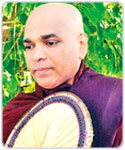Life is short,
Be mindful
 Dr. Most Venerable Dr. Most Venerable
Mirisse Dhammika Nayaka Thero
The Buddha understood Nanda’s youthful mind.
He neither imposed any restrictive measures to insult or punish him nor did He
try to isolate him. The greatest psychiatrist, the Buddha reached out to Nanda’s
mind.
The Buddha once addressed his step sister Theri Nanda. “Nanda, please look at
this body. Even though it is attractive and seductive, it is messy and
vulnerable to disease and decay. Thus, look prudently at the real nature of the
body. Concentrate your mind”. This advice helped Theri Nanda to realize the
impermanent nature of the body and attain sainthood (Arahantship). It is
important to analyze the above statement of the Buddha.
He never rejected the idea of keeping the body healthy, clean and dressed with
beautiful attire. The Vinaya and the Sutra Pitakas contain many discourses about
cleanliness and orderliness of the body. One can retrospectively recognize the
erroneous occasions in one’s life caused by appearance and attractiveness of the
body.
If one is arrogant of the attractiveness of one’s own body or apparels and
humiliates another, it is unworthy and unwholesome. For a moment, let us free
ourselves from the material world and go to a hospital to see the true nature of
life. We see many patients who are powerless, deformed and less attractive due
to illness. If we feel their pain and suffering even briefly, it is a victory
for us. One might ask what kind of victory is it.
 Indeed, it enables us to understand the true nature of life within our world
full of illusions; thus, it becomes a victory. It is quite common that we buy
insurance policies to protect us from disease, illness and future economic
discomfort. We have to insure ourselves against selfishness, insulting others,
unkindness, ill-will, arrogance etc. through creating our own policies rich in
loving kindness, compassion, tolerance, equanimity, humility and benevolence. Indeed, it enables us to understand the true nature of life within our world
full of illusions; thus, it becomes a victory. It is quite common that we buy
insurance policies to protect us from disease, illness and future economic
discomfort. We have to insure ourselves against selfishness, insulting others,
unkindness, ill-will, arrogance etc. through creating our own policies rich in
loving kindness, compassion, tolerance, equanimity, humility and benevolence.
Beauty in Youth
The day that Prince Nanda, the step brother of the Buddha became a monk was a
sad day for him. He thought his drams were shattered. Nanda also had dreams like
any other youth his age. He dreamed of a gorgeous palace, a beautiful queen in
his wife and a happy life as heir to the throne of his country.
Nanada waited anxiously until the day his dreams were fulfilled. Then the Buddha
paid a visit to the palace. King Sudhodana was overjoyed because his elder son
had come home after a long time. Like any father, the King was happy to see his
younger son Nanda succeed him as the King. But events changed. Nanda carried the
Buddha’s alms bowl and followed Him to the monastery.
He became a monk because he could not disregard the words of the Buddha. Even
though Nanda wore robes, his mind was somewhere else. Chasing thoughts until
gratification is the nature of youth.
The Buddha understood Nanda’s youthful mind. He neither imposed any restrictive
measures to insult or punish him nor did He try to isolate him. The greatest
psychiatrist, the Buddha reached out to Nanda’s mind. During a walk through a
charred forest, the Buddha showed him a mutilated body of a female monkey.
Walking with him further, He showed Nanda a group of majestically beautiful
young women. Nanda was flabbergasted and thought “these young women are so
beautiful; the princess that I am supposed to marry is much like the mutilated
female monkey compared to them”. This experience was adequate for Nanda to
realize the illusory nature of the mind and shortly thereafter he attained
sainthood.
The beauty of youth is gratifying. However, if the young mind is not
disciplined, the gratification may be lost. Often, experience shows that the
lack of discipline is the root cause for shattered dreams in the young mind.
Youthful activities will have a long lasting effect throughout one’s entire
life. Many adults regret their past because of unwise decisions made during
their youth. It is imperative to discipline the mind when young, if one plans
happiness throughout life.
Some parents live in harmony with their young offspring whereas others dwell in
disharmony. During the childhood, parents may set good examples and give right
advice to their young ones. The child’s mind absorbs information with less
resistance compared to an adolescent mind. However, if situations are handled
wisely with care, kind words and providing appropriate solutions, parents may
find it easy to resolve problems with their young. The young love freedom. If it
is made available to them under right guidance, it would lead to progress and
happiness. Beauty in youth is boundless.
Whom Do You Love?
King Kosala, a contemporary of the Buddha, asked his wife Queen Mallika ‘my
dearest Mallika, whom do you love the most in this world”? She said “My Great
King, I love myself the most”.
King Kosala was hurt and brought this colloquy to the Buddha for analysis. The
Buddha stated that Queen Mallika’s answer was correct and true to all worldly
beings. Probably, every one of us has asked this question from someone in our
lives; it may be man from the wife and vice versa or children from parents or
those who have fallen in love with each other. The answers may differ from that
of Mallika’s.
Why does an infant cry? There is a multitude of reasons such as hunger and
thirst etc. When hunger is eliminated, crying stops. What does this mean? Even
though an infant doesn’t know the parents well, it loves them because they
provide food and tender care. All this makes the infant happy. If parents leave
the child in the hands of a caregiver, the child will love profoundly the
caregiver who provides the necessities such as love, tenderness, care and food.
If one offers love and care to others, one will receive them too.
A noble bondage that connects parents with children is love. It is a condition
caused by ego-centred attachment. When offspring are successful in their
education or in a career, the parents become extremely happy because it is their
accomplishment. This becomes evident in a family with a number of children.
Often, the child who excels in every aspect experiences profound parental love
because of the accomplishment of parental expectation. It reveals that this
noble love is egocentric.
According to the Buddha’s Teachings rebirth is caused due to egocentric
attachment. It is firmly anchored in the sub-conscious mind. Loosening this grip
of attachment and its final eradication are known as Nibbana. Anyone who loves
oneself has to be sorrowless not only in this birth but also in the infinite
path of samsara (infinite deaths and rebirths). The state of sorrowlessness can
be achieved by following the peaceful path taught by all Buddhas .
Be free from all unwholesome things; Amas all wholesome thins; Lierate the mind
of all defilements. |
